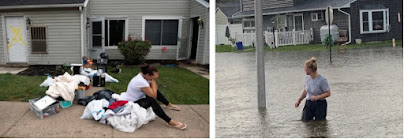For many Pennsylvanians, flooding caused by heavy spring rainfall can be a common occurrence. Just one inch of water can cause $25,000 of damage to your home.
"Many homeowners do not realize that their standard homeowner's insurance policy does not cover damage due to flooding," said Humphreys. "Flooding becomes a real threat across all of Pennsylvania during the springtime rainy season, so we're encouraging homeowners to review their policies now and consider adding flood insurance, either purchased through the rapidly growing private market or the National Flood Insurance Program."
"Flood insurance is always a good protection to have in place, so you are prepared in the event of the unthinkable and risk to your home and possessions is mitigated," added Humphreys.
Homeowners who live in federally designated Special Flood Hazard Areas (SFHAs) are likely required to have flood insurance by their mortgage lenders, however, the National Flood Insurance Program (NFIP) says one in four insurance claims comes from outside high-risk flood areas.
Individuals looking to purchase new homes and properties should research before buying to determine if the area is prone to flooding, and homeowners who have paid off their mortgages should consider maintaining their flood insurance even though they may no longer be obligated to continue it.
Consumers should be aware that flood insurance policies are not active immediately. In most scenarios, there is a 30-day waiting period before policies are active; this prevents individuals from purchasing flood insurance solely when a storm is headed in the direction of their property.
However, there are exceptions for this policy, including if the home was recently added to the federal government's SFHA map, and if the home was just purchased and the lender requires flood coverage.
Flood insurance is available through both the NFIP and private insurers. Policies can be purchased through licensed property and casualty insurance agents in Pennsylvania to cover almost any building and its contents, including rental property and condominiums.
Renters can buy flood insurance protection for their possessions as well, which are typically not covered by either a standard renters' insurance policy, or a landlord's policy which covers the building.
"Flooding is a very real threat, no matter where you live," said PEMA Director Randy Padfield. "While very few people want to consider adding expenses to their budget, flood insurance can bring peace of mind that you are financially protected from the devastation that flooding can bring."
Padfield said another important preparedness step for families to take is to create a family emergency communications plan, so that everyone knows how they will stay in touch and communicate during an emergency.
The plan should be practiced regularly so everyone is comfortable with it when the time comes to use it.
Padfield said free family emergency plan templates and downloadable checklists are available on the ReadyPA website.
Consumers can also sign up for free weather alerts from a trusted local media source or AlertPA, subscribe to the monthly ReadyPA newsletter, and download the complete Pennsylvania Emergency Preparedness Guide.
Information on both the NFIP and private flood insurance is available on the Insurance Department's one-stop flood insurance webpage.
NewsClips:
-- Inquirer: Montgomery County Neighbors Mobilize Against Proposed Development Near Flood-Prone Tookany Creek
-- Altoona Mirror: Intergovernmental Stormwater Committee May Apply To National Fish & Wildlife Foundation For Streambank Stabilization Project
-- Citizens Voice: Help Available For Those Behind On Flood Levee Fee Bills
-- Citizens Voice: Wilkes-Barre Wins FEMA Appeal For Miners Mills Flood Map
Related Article:
-- House Environmental Committee To Hold April 25 Info. Meeting On Republican Package Of Bills Attempting To Address Local Flooding
[Posted: April 21, 2022] PA Environment Digest


No comments:
Post a Comment